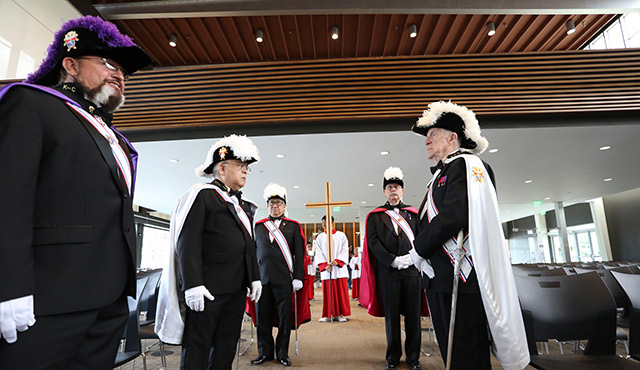Virgil Smith had always heard about the Knights of Columbus, but never really knew what the longtime fraternal organization was about until the trajectory of his life changed.
When the economy crashed in 2008, the La Palma resident had to reinvent himself professionally, moving from retail management to construction.
This life choice eventually led him to become more involved in his church, St. Irenaeus in Cypress.
Five years ago, Smith joined his local chapter of Knights of Columbus, a Catholic-focused fraternal organization dedicated to helping the needy.
What he found was fellowship and a sense of duty to help those in need.
“The camaraderie – you get to be with guys who think the same way, and you pray together and work together,” says Smith, who now serves as Grand Knight of Council No. 8599, the local council based at St. Irenaeus. “It’s not just about being in the church. It’s the feeling that you’re giving back to your community.”
That was the intent of the late Fr. Michael McGivney, a young priest who in 1881 sought to strengthen his New Haven, Connecticut, community by rallying lay leaders to create a fraternal society.
McGivney, who at 13 had to work in a spoon factory following his father’s death, saw the group as a way to unite his community spiritually while creating a mechanism to financially support families dealing with the illness or death of their breadwinners. He also saw it as an alternative to the emergence of secret societies, a major trend at the time.
In 1882, the Knights of Columbus was born.
Today, the fraternal order’s mission is just as relevant now as it was more than 130 years ago, reaching out to those in need and those who are grieving, while evangelizing the faith.
“The Knights of Columbus remains true to its founding mission and founding principles today,” says Joe Cullen, spokesman for the Knights of Columbus based in New Haven. “Early in our history patriotism was added to our principles of charity, unity and fraternity, and like them, it remains a very important part of who we are and what we do.”
Over the course of its existence, the organization has adapted to the changing times based on the community’s needs.
“In 1882, it was widows and orphans of Irish immigrants, who formed the most in need on the margins of society in late 19th century New England,” Cullen says. “Then, as the margins of our society have changed, we have adapted to the circumstances to address those changes and to care for those groups and individuals who were most in need. For instance, the blood drives we do today would not have been technologically feasible in the 1880s, but it is an important component of the charitable work we have done for decades. There are many examples of such charitable adaptations to local or changing needs. As individuals or groups find themselves in moments of particular need, we step forward to help.”
The Knights of Columbus has also expanded internationally with more than 15,100 councils and 1.9 million members throughout the world, including the Philippines, Poland, Guatemala, Ukraine and South Korea.
Since 2014, the organization has raised more than $10.5 million toward helping Christians and refugees in Iraq, Syria, Jordan and Lebanon. The Knights have also teamed up with religious agencies in the region to help give food, shelter, education, medical care and other relief.
In the aftermath of the Sandy Hook Elementary School shooting, Knights members were there lending assistance to the churches holding funerals for the young victims.
Locally, there are more than 7,000 Knights of Columbus members in the Diocese of Orange in 48 councils serving 54 parishes, according to the Knights’ OC chapter.
Members – men who are Catholic, at least 18 years old, and are in good standing with the church – lend their assistance to a variety of organizations and projects, from parish fiestas and church breakfasts to fundraisers that benefit groups such as the Special Olympics, Food for Families and Habitat for Humanity.
The Orange County chapter organizes an annual drive for the Columbian Foundation for the Intellectually Disabled, with proceeds funding Camp Re-Creation, a summer program sponsored by the Diocese of Orange and Catholic Charities that gives those with special needs a chance to experience camping for a week. It recently donated $135,000 to Catholic Charities.
Parish Councils in Orange County have also donated more than $80,000 in scholarships to seminarians and religious brothers and sisters.
One of more active councils is at St. Irenaeus in Cypress, where No. 8599 boasts about 200 members who support organizations such as the Boys and Girls Scouts.
That council organizes the annual Michael Doss Charity Golf Tournament, a fundraiser that supports local charities and community service projects, including the American Wheelchair Mission, People with Intellectual Disabilities, His Nesting Place and the La Habra Life Shelter.
“It’s a great way to give back to my parish,” says Irv Cuevas, a Seal Beach resident and a member of No. 8599. “There’s a feeling of kinship of like-minded people involved in a spiritual endeavor. You have to experience it to feel it.”
Visit ockc.net for more information about the organization and how to join.

